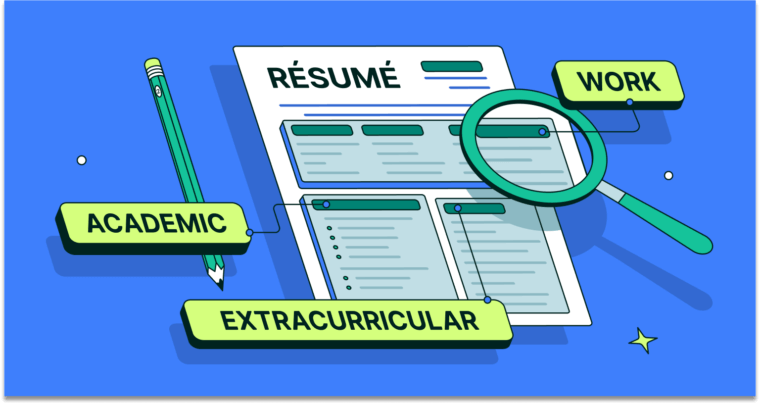
Résumé summaries are all about showing employers your best stuff right off the bat. The purpose of a résumé summary is to show hiring managers you’re the best candidate for the job. The summary is a concise snapshot of your qualifications, skills, and experience, that highlight your value as a candidate.
We’ll explore what to include, look at three examples of effective résumé summaries, and clarify the distinction between a résumé objective and a résumé summary. Let’s craft a compelling summary that captures the attention of hiring managers.
What is a résumé summary?
A résumé summary, also known as a professional summary or career summary, is a concise paragraph or section at the top of a résumé that provides an overview of your qualifications, skills, and experience. The purpose of a résumé summary is to hook the hiring manager so they want to learn more about you.
Résumé summary vs. résumé objective
The résumé summary focuses on showcasing your qualifications and aligning them with the job requirements, while the résumé objective focuses on your career goals and aspirations. Usually, experienced professionals or career changers use résumé summaries. A résumé objective suits individuals just starting their careers, who have limited work experience.
When should you include a résumé summary?
Whether or not you should include a résumé summary depends on your circumstances and the norms in your industry. The following are a few situations where including a résumé summary is beneficial.
1 When you have experience: If you have several years of experience, a résumé summary can provide a quick overview of your expertise and accomplishments.
2 When changing careers: If you’re transitioning into a new industry or field, a résumé summary allows you to summarize transferable skills, relevant experiences, or certifications that make you a strong candidate for the new role.
3 For senior positions: Showcase your leadership abilities, industry knowledge, and notable achievements to establish credibility.
How to write a résumé summary in 5 steps
Let’s write a résumé summary together, step by step.
1 Gather career details
Before you write your résumé summary, assemble a list of career information about yourself. (If you’ve already prepared a résumé for a similar job, you can probably refer to it. Just make sure you’ve gathered all the experience that’s applicable for this new situation.) You’ll create a custom-tailored résumé summary for each job application you fill out, so keep this list of information handy.
You’ll want to have the following:
- Years of experience
- Areas of expertise
- Notable accomplishments
- Relevant skills
2 Create a draft
Create a draft or outline that you can update for each job you apply to. In your draft, summarize your accomplishments—and quantify them, when possible—to prove you’re a great candidate. Use résumé action words to accentuate your achievements and skills so hiring managers can visualize you in the open role.
Here’s an outline you can use to structure your résumé summary.
- 1 sentence: Describe who you are and your career.
- 2–3 sentences: Use résumé action verbs when you describe relevant skills, experience, or accomplishments.
- 1 sentence: Explain what you’re seeking in this job.
3 Use résumé keywords
Résumé keywords give your résumé a better shot of getting through the applicant tracking system (often referred to as an ATS). You can find résumé keywords within the job listing. These keywords will fall into four categories—job-related skills, action verbs, education requirements, and relevant experience—and they will be sprinkled throughout the job listing, especially in the “qualifications” and “responsibilities” sections. They can also be found on a company’s website: Look for how they talk about their company on the About page to see how you can gear your résumé to the job using similar language.
4 Tailor your summary for each application
Each hiring manager or recruiter looks for specific keywords and information specific to the job description they’re hiring for. Customizing your résumé summary for each job you apply for helps you stand out. Incorporate résumé keywords from the job description and mention the specific role in your last sentence.
5 Edit
Edit your résumé summary before you submit it. Edit the summary to ensure that the information you share with prospective employers is accurate and that you’re presenting yourself in the best possible light. Double-check that you’ve reported any relevant achievements, and make sure each sentence mentioning your résumé skills or accomplishments begins with an action verb. Then, run your résumé summary through a spelling and grammar check.
Résumé summary examples
Here are three examples of résumé summaries to inspire your creativity.
Digital Marketer résumé summary example
Results-oriented marketing professional with 5+ years of experience in developing and implementing strategic marketing campaigns for global brands. Proven track record of driving revenue growth, increasing brand awareness, and managing cross-functional teams. Skilled in market research, digital marketing, and campaign analytics. Strong interpersonal and communication abilities, able to collaborate effectively with stakeholders at all levels. Seeking a challenging marketing role to leverage my expertise and contribute to company success.
Software Developer résumé summary example
Experienced software developer with a proven track record of designing and implementing robust and scalable applications. Proficient in multiple programming languages and frameworks, with a strong focus on full-stack development. Skilled in analyzing complex problems and devising innovative solutions to optimize performance and user experience. Collaborative team player with excellent communication skills and a passion for staying up-to-date with emerging technologies. Seeking a challenging software development role to leverage my expertise and contribute to the success of cutting-edge projects.
Teacher résumé summary example
Dedicated and passionate educator with a strong background in teaching and a genuine commitment to student success. Skilled in developing engaging lesson plans and instructional materials to foster a dynamic and interactive learning environment. Experienced in managing classroom behavior and promoting a positive and inclusive atmosphere. Demonstrated ability to assess individual student needs and adapt teaching strategies accordingly. Excellent communication and collaboration skills, fostering strong relationships with students, parents, and colleagues. Seeking a teaching position where I can use my expertise and enthusiasm to inspire and empower students to reach their full potential.
Résumé summary FAQs
What is a résumé summary?
A résumé summary is a concise paragraph at the beginning of a résumé that highlights your qualifications and key skills. It provides a snapshot of your professional background and aims to grab the attention of hiring managers. Its purpose is to quickly convey your value proposition as a candidate and showcase why you are a strong fit for the job.
How is a résumé summary different than a résumé objective?
The résumé summary showcases your qualifications and aligns them with the job requirements. It highlights relevant achievements and capabilities to grab the hiring manager’s attention. The résumé objective states your career goals and aspirations. A résumé summary is for experienced professionals or career changers, while a résumé objective suits those starting their careers with limited experience.
What should you include in a résumé summary?
You should include key qualifications, notable accomplishments, relevant skills, and your years of experience in a résumé summary. Focus on showcasing your expertise and aligning it with the job’s requirements. Tailor the summary to the position you’re applying for to demonstrate your value as a candidate.






